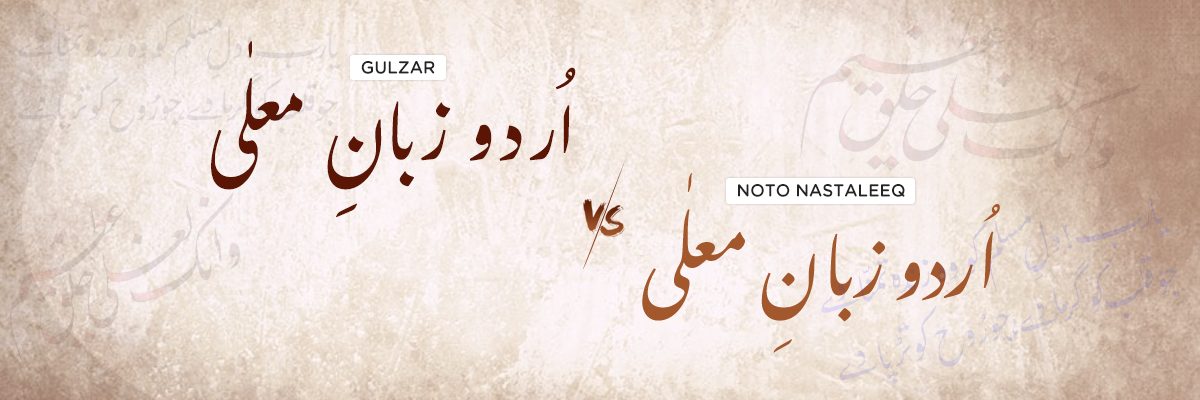When it comes to designing Urdu content, selecting the right font is very important. As the font decides how the message is received. Urdu is a language that is known for its elegant script and expressions. It is mostly written in Nastaleeq style that combines beauty with meaning. Over the time, we have seen that digital typography has evolved a lot, giving rise to fonts that bring the aesthetics of Nastaleeq to modern platforms.
There are two widely known fonts that follows Nastaleeq script, Gulzar and Noto Nastaleeq Urdu. They stand out as a leader in the field. Each font offers unique features that meets the specific needs of designers, publishers, and digital content creators. In this article we are going to explore the basic characteristics of these font, their areas of strengths, and how they are differentiated in terms of useability. We will not only compare their aesthetics but also their technical specifications. So. Lets get started.
Gulzar Font
Gulzar is a well-known modern Urdu font that was released on 27th September, 2022. It provides a perfect balance between the traditional calligraphy style or Urdu and the modern design. The font supports 417 languages and it is inspired by the Nastaliq script. It is appreciated for its graceful curves and the clean lines. You can use this font for both digital media and the print media. This font consists of 413 characters and 1161 glyphs. Gulzar is the first Nastaleeq typeface with an original Latin counterpart.
Click on the link below and download Gulzar font.
Key Features of Gulzar Font
Here are some of the major features explained below.
| Elegant Look | Gulzar has a sophisticated and sleek design. The letters of this font are beautifully curved and they resemble the handwriting style of Urdu calligraphy. |
| Readability | Yes, where it is maintaining the artistry of traditional writing, it is also ensuring that the text is easy to read specially in longer paragraphs. |
Featured Font | Research has shown that, Gulzar Urdu font has been featured in more than 4700 websites all over the world. |
| Versatility | Whether you are creating a formal document, designing a logo, or working on a creative project, Gulzar works well for different types of content. |
| Matching Latin Typeface | Gulzar Urdu font is the first one to have its matching Latin font. This means it includes all the letters needed to write in Arabic, Persian, and Urdu languages correctly. |
| Widely Used in Pakistan: | This font is particularly popular in Pakistan for publications, advertisements, and digital content creation due to its aesthetic appeal. |
Noto Nastaliq Urdu
Noto Nastaliq Urdu is a font that truly reflects the classical Nastaliq script. Nastaliq has been a core part of Urdu writing for centuries. Noto Nastaliq is developed by Google in 2016 as a part of their Noto font family. The font has 1138 glyphs with character set of 276 symbols. It has thick and thin strokes as well as serifs that provides great legibility. It comes in 4 weights including semibold, regular, medium, and bold. Noto Nastaliq is designed to support a wide range of languages, including Urdu.
Click on the link below and download Noto Nastaliq font.
Key Features of Noto Nastaliq Urdu
Here are some of the major features explained below.
| Authentic Nastaliq Style | This font mimics the traditional Nastaliq writing style. It has flowing letters and slanted lines that gives artistic and authentic look. |
| Variety of weights | Noto Nastaliq contains 4 font weights that can be utilized in different projects and designs accordingly. |
| Widespread Compatibility | As a part of the Noto font family, it is designed to work smoothly across different devices and platforms. It ensures that it displays consistently no matter where it is. |
| Cultural Importance | Nastaliq has a deep connection with the historical significance of Urdu language. Noto Nastaliq preserves this legacy and maintain its classical appearance. |
| OpenType (OT) features | It has nine open type features that supports 281 characters and six Unicode blocks. |
Comparing Gulzar and Noto Nastaliq Urdu
Gulzar features a modern and clean appearance while still incorporating elements of traditional calligraphy. In contrast, Noto Nastaliq showcases the classical Nastaliq script, recognized for its slanted and interconnected letters. When it comes to readability, Gulzar excels in both short and long texts thanks to its legible design, while Noto Nastaliq also provides high visibility. Gulzar is often preferred for versatile applications such as print media, web design, and branding materials. On the other hand, Noto Nastaliq is ideal for web content, mobile apps, PDFs, and social media posts, making it a suitable choice for digital platforms.
| Aspects | Gulzar Urdu Font | Noto Nastaliq Urdu Font |
| Developer | Borna Izadpanah, Fiona Ross, Alice Savoie, and Simon Cozens. | Developed by Google as part of the Noto Project |
| Released on | September 27, 2022 | 2016 |
| Glyph Count | 1,138 glyphs | 1161 glyphs |
| Character Set | 413 characters | 276 symbols |
| Language Support | Primarily Urdu, limited Arabic scripts | Urdu, Arabic, and multiple regional languages |
| Platform Support | Optimized for print, limited digital support | Fully compatible with web, mobile, and print |
| Font Styles Available | Regular | Multiple weights (Regular, Bold, Semibold, Medium etc.) |
| File Size | Lighter | Heavier |
Bottom Line
Both Gulzar and Noto Nastaliq Urdu fonts are outstanding choices, each excelling in different contexts. Gulzar is perfect for traditional print projects that require an artistic touch, making it an excellent option for poetry books, posters, and magazine covers. However, its limited weight options may hinder its practicality in digital formats. Conversely, Noto Nastaliq Urdu shines in the digital realm, offering extensive language support, high performance, and seamless integration. This makes it an ideal choice for web developers, app designers, and content creators focused on multilingual projects. Ultimately, the decision between these fonts should be guided by your specific design goals and the medium in which you plan to use them.



